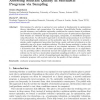874 search results - page 68 / 175 » Iterative Learning Control - Monotonicity and Optimization |
138
Voted
NIPS
1996
15 years 4 months ago
1996
Dynamic Programming, Q-learning and other discrete Markov Decision Process solvers can be applied to continuous d-dimensional state-spaces by quantizing the state space into an arr...
126
click to vote
NIPS
2001
15 years 4 months ago
2001
Tangential hand velocity profiles of rapid human arm movements often appear as sequences of several bell-shaped acceleration-deceleration phases called submovements or movement un...
128
click to vote
ICML
1995
IEEE
16 years 3 months ago
1995
IEEE
A number of reinforcement learning algorithms have been developed that are guaranteed to converge to the optimal solution when used with lookup tables. It is shown, however, that ...
112
click to vote
ANOR
2005
15 years 2 months ago
2005
This paper addresses the problem of loading a finite capacity, stochastic (random) and dynamic multi-project system. The system is controlled by keeping a constant number of projec...
121
Voted
MP
2006
15 years 2 months ago
2006
Determining if a solution is optimal or near optimal is fundamental in optimization theory, algorithms, and computation. For instance, Karush-Kuhn-Tucker conditions provide necessa...

